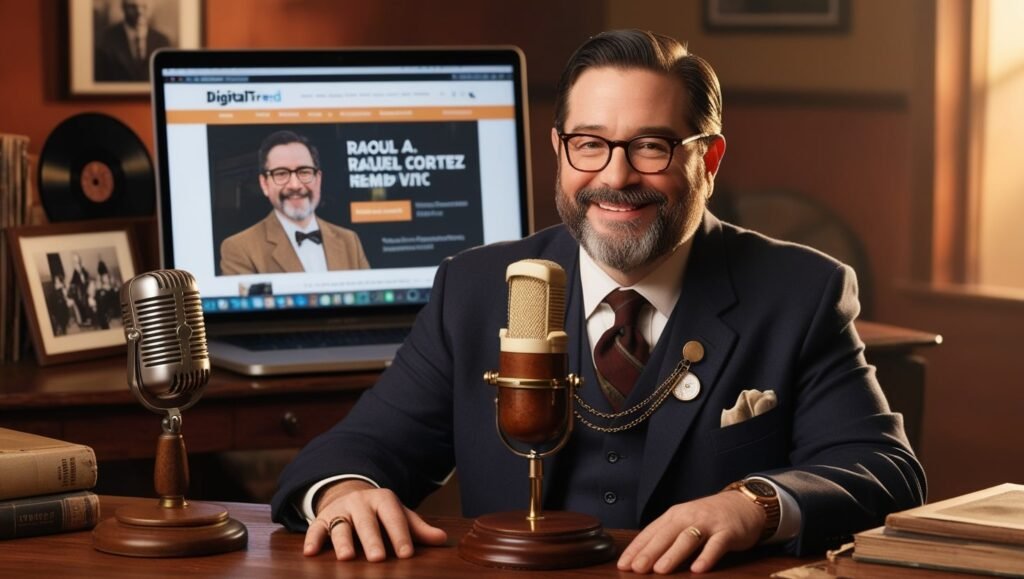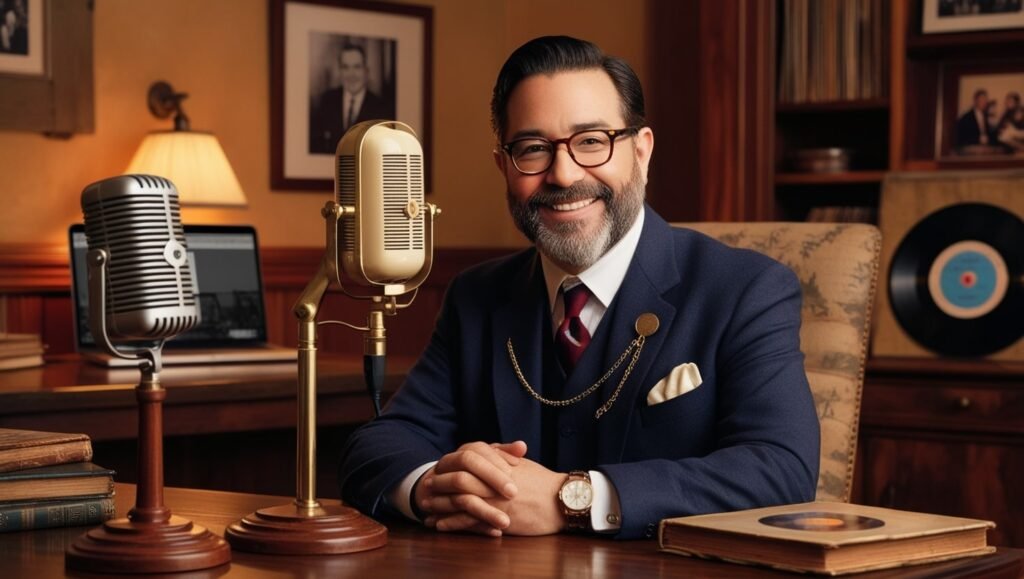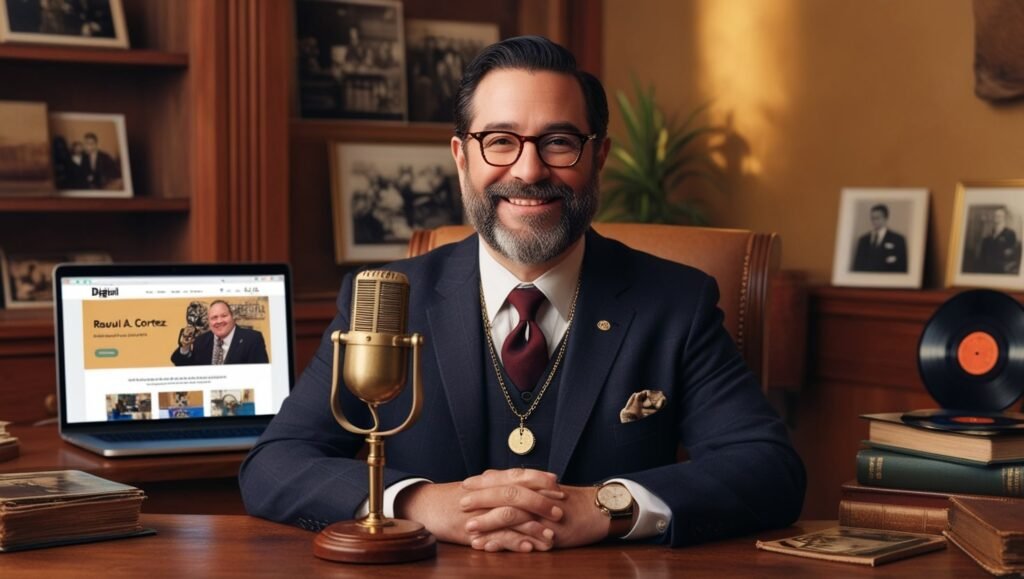Raoul A. Cortez pioneered Hispanic media, whose contributions shaped how Spanish-language broadcasting developed in the United States. His vision, dedication, and relentless effort opened doors for many, particularly when opportunities for minorities were limited. Raoul A. Cortez is remembered for building a platform for Spanish-speaking audiences and empowering future generations with his tireless advocacy.
This article explores the life, impact, and legacy of Raoul A. Cortez. His contributions were essential not only in media but also in pushing for broader social change. In 1946, he founded KCOR-AM, the first Spanish-language radio station in the United States, marking a monumental moment in media history. Through the power of broadcasting, Raoul A. Cortez ensured that Latino communities had a voice, providing essential news, music, and cultural programs that were otherwise absent from mainstream media.
Early Life of Raoul A. Cortez
Raoul A. Cortez was born in Mexico and immigrated to the United States, where he quickly recognized the importance of communication in building communities. Settling in San Antonio, Texas, he became deeply involved in Mexican-American issues. This awareness of the challenges facing the Hispanic population fueled his desire to create a media platform that could bridge cultural gaps and address the community’s needs.
The challenges of establishing a broadcasting platform in the 1940s were immense. Most radio stations catered exclusively to English-speaking audiences at the time, leaving little room for Spanish-language content. However, Raoul A. Cortez’s determination to launch KCOR-AM reflected his deep understanding of how media could unite communities, spread information, and preserve cultural identity.

KCOR-AM: A Historic Milestone
KCOR-AM became a turning point for Spanish-language media, thanks to the vision of Raoul A. Cortez. As the first station of its kind, KCOR-AM aired news, music, entertainment, and public service announcements tailored to Spanish-speaking audiences. This radio station became a lifeline for many Mexican-American families in Texas and beyond, offering them a sense of belonging and cultural affirmation.
Raoul A. Cortez’s efforts ensured that issues affecting the Hispanic community were highlighted. His station broadcast programs that encouraged civic participation, educated listeners about their rights and brought visibility to matters that mainstream media often ignored. Raoul A. Cortez knew that media could be a powerful tool for entertainment, education, and advocacy.
Expanding the Reach of Spanish-Language Media
The success of KCOR-AM inspired Raoul A. Cortez to look beyond radio and explore other media opportunities. In the 1950s, he expanded his efforts into television, launching KCOR-TV, the first Spanish-language TV station in the U.S. This transition from radio to television marked another groundbreaking moment, showing how Raoul A. Cortez remained at the forefront of media innovation.
KCOR-TV aired various programming, including news broadcasts, telenovelas, and children’s shows, providing diverse content for Latino families. The station was not just a source of entertainment—it became a trusted platform where Raoul A. Cortez continued his mission to inform and uplift his community.
Overcoming Obstacles in Broadcasting
Starting radio and television stations in an era of limited financial resources and societal barriers was no small feat. Raoul A. Cortez faced numerous challenges, from securing funding to overcoming regulatory hurdles. Yet, his resilience and unwavering commitment allowed him to overcome these obstacles. His ability to navigate a difficult landscape made him a true pioneer and role model for others who sought to enter the media industry.
Despite these challenges, Raoul A. Cortez remained focused on creating a space where the Hispanic community could connect, learn, and grow. His success in establishing Spanish-language media outlets paved the way for future generations of broadcasters and journalists.
Raoul A. Cortez’s Advocacy for Social Change
Raoul A. Cortez was not just a media entrepreneur but also a social advocate. Through his work in broadcasting, he promoted civic engagement among Mexican Americans, encouraging them to vote, participate in local government, and demand equal rights. His radio and television stations regularly featured programming focused on education, social justice, and political awareness.
Raoul A. Cortez believed in the power of media to create social change. He used his platforms to spotlight injustices, celebrate cultural heritage, and empower individuals to become active members of their communities. His efforts helped shape a more inclusive media landscape, setting a precedent for future media outlets focused on minority representation.
Recognition and Legacy
The legacy of Raoul A. Cortez extends far beyond the establishment of KCOR-AM and KCOR-TV. His work laid the foundation for the growth of Spanish-language media across the United States, leading to the creation of major networks such as Univision and Telemundo. Today, many broadcasters and media professionals owe their careers to the trail blazed by Raoul A. Cortez.
Raoul A. Cortez received numerous awards and recognitions throughout his lifetime for his media and advocacy contributions. His work earned him respect from the Hispanic community and leaders in journalism and broadcasting. His legacy is a testament to the impact one person can have when a sense of purpose and community responsibility drives them.
The Continuing Influence of Raoul A. Cortez
Today, the influence of Raoul A. Cortez can still be seen in how media outlets engage with Spanish-speaking audiences. His pioneering efforts showed that media could be both profitable and socially responsible. The stations he founded became models for future media ventures, proving that diversity and inclusion are essential to success.

The impact of Raoul A. Cortez goes beyond broadcasting. His story continues to inspire entrepreneurs, community leaders, and activists who believe in the power of communication to drive change. As Hispanic media grows and evolves, the legacy of Raoul A. Cortez serves as a reminder of the importance of representation and community connection.
Honoring Raoul A. Cortez’s Contributions
Many institutions have honored the work of Raoul A. Cortez, ensuring that his contributions are not forgotten. Schools, museums, and community organizations have recognized his role in shaping Hispanic media and fostering cultural pride. His story has been shared as an example of perseverance and vision, teaching future generations about the value of dedication to business and community service.
Raoul A. Cortez’s work resonates especially today as the media landscape evolves. In a world where representation and inclusion are more important than ever, the pioneering spirit of Raoul A. Cortez reminds us that progress is possible through determination and a commitment to community.
The Ongoing Relevance of Raoul A. Cortez’s Legacy
In a media environment where diversity and cultural awareness are essential, the contributions of Raoul A. Cortez remain profoundly relevant. His efforts taught us the importance of creating media that reflects the identities of all communities, not just the majority. At a time when minority voices were often silenced, Raoul A. Cortez gave those voices a platform, forever changing the media landscape.
As discussions about representation continue today, the story of Raoul A. Cortez serves as a powerful reminder of how media can drive social progress. His commitment to business success and community empowerment illustrates the potential of entrepreneurship guided by social responsibility. Future media innovators can look to his example as they navigate the challenges and opportunities of an evolving industry.
The Personal Sacrifices of Raoul A. Cortez
Behind the public achievements of Raoul A. Cortez were countless personal sacrifices. Launching KCOR-AM and KCOR-TV required long hours, financial risks, and an unwavering belief in his mission. Despite facing prejudice and skepticism from mainstream media circles, Raoul A. Cortez remained focused on his goals, knowing that his work was essential for the cultural enrichment of his community.
His challenges highlight the strength and resilience required to break new ground. Raoul A. Cortez understood that meaningful change rarely comes without struggle and embraced the challenges with courage and determination. His perseverance is a testament to what can be accomplished when one refuses to accept limitations.
A Symbol of Empowerment for Future Generations
Raoul A. Cortez’s story is not only one of professional achievement but also of empowerment. By proving that Hispanic voices deserved a place in the media landscape, he inspired generations to believe in their potential. Today, young people pursuing careers in media and broadcasting can look to his example for guidance and encouragement.
Raoul A. Cortez’s life is an enduring lesson in the power of hard work and community-focused leadership in classrooms, community centers, and professional networks. His legacy encourages individuals to take pride in their cultural heritage while striving for excellence in their chosen fields.

Remembering Raoul A. Cortez Through Memorials and Honors
Several memorials and institutions have been named to honor Raoul A. Cortez, ensuring his legacy is remembered and celebrated. Public schools, community centers, and scholarships bear his name, recognizing his contributions to media and his role as a community advocate. These honors reflect the deep respect and gratitude felt by those who continue to benefit from his groundbreaking work.
In addition, organizations focused on media diversity frequently reference the pioneering efforts of Raoul A. Cortez as a source of inspiration. His work remains a cornerstone in the history of Spanish-language media and serves as a reminder that progress is achievable, even in the face of adversity.
Conclusion: The Enduring Impact of Raoul A. Cortez
The life and work of Raoul A. Cortez exemplify the power of vision, perseverance, and community engagement. Through his efforts in radio and television, he created platforms that celebrated Hispanic culture and addressed the needs of underrepresented communities. His legacy as a pioneer in media continues to influence how broadcasters approach diverse audiences today.
Raoul A. Cortez’s journey from immigrant to media trailblazer is a story of resilience and impact. His overcoming challenges and staying focused on his mission set a powerful example for others. As the media industry continues to grow and diversify, the work of Raoul A. Cortez remains relevant, serving as a beacon of inspiration for those committed to positive change.






